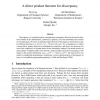Free Online Productivity Tools
i2Speak
i2Symbol
i2OCR
iTex2Img
iWeb2Print
iWeb2Shot
i2Type
iPdf2Split
iPdf2Merge
i2Bopomofo
i2Arabic
i2Style
i2Image
i2PDF
iLatex2Rtf
Sci2ools
143
click to vote
COCO
2008
Springer
2008
Springer
A Direct Product Theorem for Discrepancy
Discrepancy is a versatile bound in communication complexity which can be used to show lower bounds in the distributional, randomized, quantum, and even unbounded error models of communication. We show an optimal product theorem for discrepancy, namely that for any two Boolean functions f, g, disc(f g) = (disc(f)disc(g)). As a consequence we obtain a strong direct product theorem for distributional complexity, and direct sum theorems for worst-case complexity, for bounds shown by the discrepancy method. Our results resolve an open problem of Shaltiel (2003) who showed a weaker product theorem for discrepancy with respect to the uniform distribution, discUk (fk) = O(discU (f))k/3. The main tool for our results is semidefinite programming, in particular a recent characterization of discrepancy in terms of a semidefinite programming quantity by Linial and Shraibman (2006).
Related Content
| Added | 18 Oct 2010 |
| Updated | 18 Oct 2010 |
| Type | Conference |
| Year | 2008 |
| Where | COCO |
| Authors | Troy Lee, Adi Shraibman, Robert Spalek |
Comments (0)

